(8)レーニンの黒い資金源~若きギャング、スターリンの暗躍
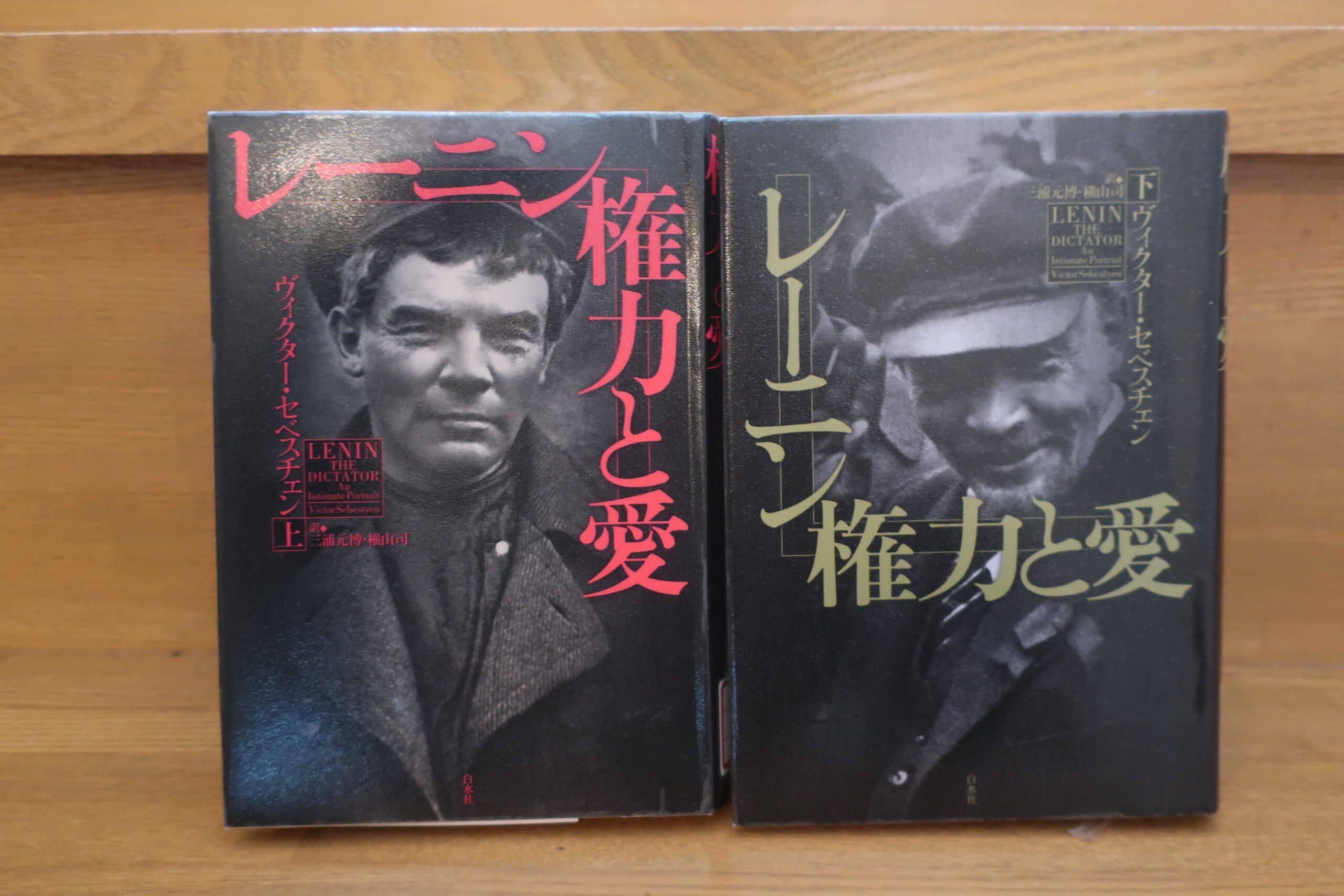
ヴィクター・セベスチェン『レーニン 権力と愛』を読む⑻
引き続きヴィクター・セベスチェン著『レーニン 権力と愛』の中から印象に残った箇所を紹介していきます。
レーニン・ボリシェヴィキ党の意外な資金源
1905年、前年に勃発した日露戦争の敗北や政権不満によって首都サンクトペテルブルグで大規模デモが起こります。
それに対し皇帝はデモの排除を命令し、無抵抗の市民に対し銃を発砲するなどの実力行使を行います。これにより多数の死者が出ました。この事件を血の日曜日事件といいます。
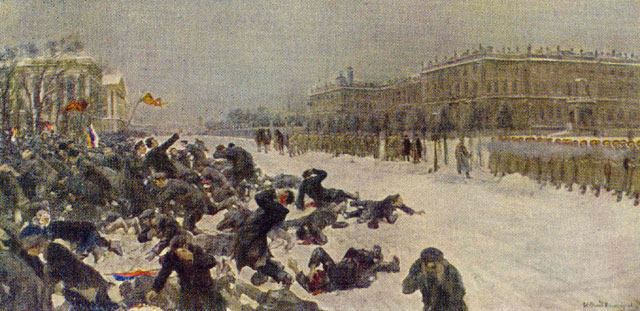
この事件によって国内の皇帝に対する不満は危険なほどに高まりました。以下の引用はその時代の実業家たちの行動を書いたものです。
億万長者のサーヴァ・モロゾフはロシア社会民主労働党への支援金を増やし、他の産業家も社会主義者や自由主義者への資金援助をはじめた。「そうすることが流行になった。それで彼らの気が休まるのなら、支援してくれてもかまわなかった」と、レオニード・クラーシンは語っている。「献金」の多くを処理していた出納の専門家で、ボリシェヴィキの金庫番だった人物だ。彼は、産業家が自分たちの個人的利益にこれほど根本的に反する運動を支援するのは、一種の倒錯した俗物根性だと考えていた。
「当時、急進的あるいはリベラルな社会層で、革命政党に献金することは……良い趣味とみなされていた―五ルーブルから二五ルーブルを〔毎月〕定期的に寄付する人びとのなかには、著名な弁護士、技術者、医師だけではなく、銀行の重役や政府機関の当局者も含まれていた」。
皇帝が犯した大きな過ちは、モロゾフ、パーヴェル・リャプシンスキー、アレクサンドル・グチコフといった富裕な大実業家まで敵に回してしまったことだ。皇帝は、「商売」に携わっている者どもと付き合うのは沽券にかかわると考え、彼らがいかに重要になってくるかが分かっていなかったのだ。
実業界の多くは西欧流の改革を求める自由主義者を支持した。サンクトぺテルブルク郊外の広大な工場で二万七〇〇〇人を雇用し、ロシア軍の兵器の多くを製造している、もっとも裕福なロシア産業家の一人、アレクセイ・プチロフは語った。「帝政は終わりだ。もはや望みはない」
白水社、ヴィクター・セベスチェン、三浦元博、横山司訳『レーニン 権力と愛』上巻P234-235
※一部改行しました
社会主義(共産主義)は資本家を嫌うというのが私たちの一般的なイメージかもしれません。私もそう思っていました。
しかしこの頃のロシアでは資本家が社会主義政党を支援していたのです。それほどロシア政府への反発が高まっていたのです。これは完全に皇帝の失策です。国の経済を動かす人物達をないがしろにしたつけが回ったのでした。
資本家たちはレーニンを含むボリシェヴィキに経済援助をしましたが、もし帝政側がしっかりと政治を行っていたらそういうことにはならず、歴史は変わっていたかもしれません。
「収奪」という名の強盗ーレーニンの黒い資金源。若きギャング・スターリンの暗躍
一部の批判者が敵の面前でのレーニンの臆病さを非難する一方、別の革命家たちは彼に「ギャング」や「こそ泥」も同然の「追いはぎ」というレッテルを貼る。ボリシェヴィキとメンシェヴィキの間に、深刻な政治的相違や原則問題はほとんどないとしても、戦術に関しては、多くの鋭い不一致があった。
ロシア社会民主党働党は革命の資金を富豪―過ぎ去りし日のロシア財閥―からの献金だけに頼ってやっていくわけにはいかなかった。資金を別の手段で見つけなければならず、レー二ンは党の意を受けて盗みを働く、事実上の犯罪者集団を創設した。これがおそらくロシア・マフィアの原型だ。
彼は襲撃を一つとして自ら直接指示したわけではなく、それをマルクスを思わせる「収奪」の名で呼んだが、どんな婉曲表現を使ったとしても、それは強盗そのものだった。レーニンは「技術委員会」の責任者にレオニード・クラーシンを据えた。クラーシンは自分の右腕となる「まとめ役」のトップにスターリンを据え、スターリンがロシア帝国内で多くの「エクスプロ〔強制収奪〕」を計画し、実行した。
彼らが雇ったさまざまなギャングたちは多数の銀行で強盗を働き、バクー港に停泊していた蒸気船「ニコライ一世号」の金庫から巨額の現金と金塊を強奪し、あちこちの郵便局や国営鉄道の切符売り場を襲った。
クラーシンは秘密の印刷機を使って偽札を刷るという大がかりな作戦を計画したが、十分な技量をもった偽造職人を見つけることができなかった。
マルトフ、プレハーノフ、そしてメンシェヴイキたちは愕然とし、「ごく当然の道徳的、実際的理由で、犯罪行為にかかわること」を望まなかった。「そうした行為は、われわれのうちだれに深刻な跳ね返りをもたらさないとも限らないのだから。われわれは泥棒に見られたくなかった」。
レーニンは彼らを軽蔑した。彼はマルトフに「子ヤギの革の手袋を着けて革命を成し遂げることはできない」と言った。
白水社、ヴィクター・セベスチェン、三浦元博、横山司訳『レーニン 権力と愛』上巻P250-251
※一部改行しました
ここは私にとってもかなり驚いた箇所です。
こうまで堂々と強盗をしそれを資金源にする集団が政治集団として表舞台にいるという事実。
そしてこの時から影のギャングスターとして暗躍していた後のソ連の独裁者スターリンの存在。
これはソ連史、特にレーニンとスターリンを学ばなければ知らずに終わっていた事実でした。
「収奪者が収奪される」ーレーニンは強盗も正当化する
彼は盗みを正当化するため、複雑で相矛盾した議論を展開した。初期のボリシェヴィキのうち、もっとも知性ある人物の一人で、常に信頼できるレー二ン支持者だったマクシム・リトヴィノフはあるとき彼に聞いた。
「スタリーク〔レーニンの暗号名で「老人」の意〕、あなたはいつも『収奪者を収奪する』ことは正しいと説いている。教えてください、もしあなたが路上で分厚い財布を持ったロスチャイルドに遭遇したら、回転式拳銃で脅して金を盗みますか?」。
レーニンは笑いながら答えた。「そうは思わないね。でも、もし権力の座に就いたら、ロスチャイルドの銀行とその資産を国有化する命令をためらわずに出すだろう。とはいえ、これは……勝利した人民とその政府によって合法的になされなければいけないプロレタリア国家も含めて、国家が存在する限り、法による支配は必要だ。さもなければ、すべては崩れさり、最も原始的な本能が解き放たれてしまう」。予言的な言葉ではあった。
白水社、ヴィクター・セベスチェン、三浦元博、横山司訳『レーニン 権力と愛』上巻P252
※一部改行しました
資本家は労働者から収奪していたのだから、我々から収奪されるのは当然だという理屈をレーニンは主張します。まさに「目的は手段を正当化する」というレーニンの思想が表れています。
レーニン・スターリンの最も劇的な「強制収奪」ーチフリスの現金強奪事件
もっとも劇的な「強制収奪」は、一九〇七年七月にスターリンが指揮を執った。ロンドンの党大会がはっきりと禁止し、レーニンが、今後は収奪を容認しないと約束して、わずか数週間後のことである。
ある銀行の馬車に積んだ巨額の輸送現金が、グルジアの首都テイフリス(現在のトビリシ)中心部で白昼に襲われた。スターリンが首謀者で、ヤクザのボリシェヴィキ、カモ(本名シモン・アルシャキ・テル=ぺトロシャシ)の率いる一団が、市中心部のロシア国立銀行へ運ばれる途中の現金を強奪するのを、物陰から見ていた。
一五人の無関係な通行人が爆弾や銃撃で殺害され、五〇人近くが重傷を負った。これはボリシェヴィキが関与した強盗事件のうちでも群を抜いて大掛かりなものであり、国際社会やヨーロッパ中の革命政党を動揺させたが、儲けはもっとも少ないものの一つだった。
長期的には、コストは高くついた。強盗がどれだけの金額を持ち去ったのか、国立銀行はきちんと把握できなかった。ざっと二五万~三四万ルーブルだと見積もった。当時としては、莫大な金額である。ニ〇一六年の価値に換算して最大で四〇〇万米ドル以上に相当する。
問題は、盗んだ現金のほとんどが高額紙幣で、紙幣に印が付いているか、あるいは警察が通し番号を知っていることだった。
レーニンはこの犯罪から表向きは距離を取っていた。しかし、事件が起きる前に内々に計画の詳細をすべて承知しており、それを承認していた。他の強奪事件の収益と同様に、スターリンは金の一部を個人的にレーニンに渡す。また、カモはジュネーブでレーニンに現金を渡した。
信頼できる党活動家を使って、ヨーロッパの諸都市でこの紙幣を両替するというアイデアはレーニンが出した。この計画は見事なまでに裏目に出た。紙幣は追跡され、数週間のうちに、カモを含む十数人の党活動家が拘束された。
白水社、ヴィクター・セベスチェン、三浦元博、横山司訳『レーニン 権力と愛』上巻P255-256
※一部改行しました
この事件は後にこのブログでも読んでいくスターリン伝でも出てきますが、この大規模な襲撃事件はかなりショッキングです。レーニンの政治資金はこうした「手段を選ばぬ」ことによって得たお金によって賄われていたのです。
結婚詐欺による資金獲得
レーニンはスターリンなどを使った実力行使による現金強奪の他にも、様々な手を使って資金を集めています。それが次の引用です。
流血の度合いは少ないが、同じように卑劣で、道徳的にいかがわしいのぼシュミット遺産詐欺事件だ。レー二ンは二人の一〇代の少女から、彼女たちが引き継いだ遺産を詐取する計画を立て、ほぼまちがいなく、その過程で彼女たちの心に傷を負わせた。これは、レーニンの最も恥知らずな面を示すエピソードだ。
自分の金のことになると、彼は清廉潔白そのもので、欲深いところはまったくないのだが、政治のことになると、ボリシェヴィキの利益を増大させる資金のためなら、嘘をつき、盗み、欺し、殺すことをいとわなかった。「プロレタリアートの大義のために行われることばすべて誠実なのだ」と、彼はアンジェリカ・バラバーノワに言った。
白水社、ヴィクター・セベスチェン、三浦元博、横山司訳『レーニン 権力と愛』上巻P256
※一部改行しました
若くして亡くなった資産家シュミットの遺産を引き継ぐ一〇代の少女に狙いを定めその遺産を手に入れようとレーニンは画策します。
レーニンはこの若者の死を聞き、チャンスだと思った。彼はシュミットには二人の妹がいることを知っていた。一九歳のエカチェリーナと一七歳のリザヴェータで、二人とも革命運動に関心をもっている。いまや遺産相続人となった二人は、冷酷な動機をもった金の亡者にとっては大変においしい「カモ」である。
レーニンは少女たちを誘惑して結婚する役割のハンサムな若い党活動家二人を選抜した。彼女らはロマンスに溺れ、革命を支援することに有頂天となって、ボリシェヴィキに資産を引き渡すだろうというわけだ。
白水社、ヴィクター・セベスチェン、三浦元博、横山司訳『レーニン 権力と愛』上巻P257
※一部改行しました
自分の手下のハンサムな男を使って彼女たちを誘惑し結婚させる。そして遺産を奪うという計画を彼は実際に実行しました。この事件については長くなってしまいますのでこれ以上はお話しできませんが、実際に手下たちと少女2人は結婚し、遺産目的のレーニンの策略はある程度実現したことになりました。
目的のためにはどんな行動も正当化するレーニンを端的に表すエピソードとしてこの本では紹介されていました。
続く
Amazon商品ページはこちら↓
次の記事はこちら
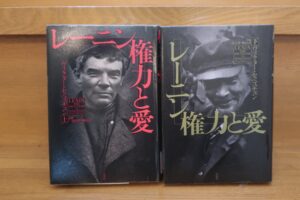
前の記事はこちら

「レーニン伝を読む」記事一覧はこちらです。全部で16記事あります。

関連記事





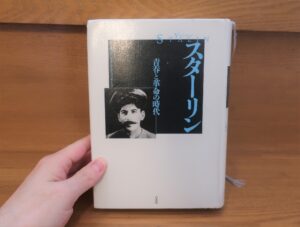

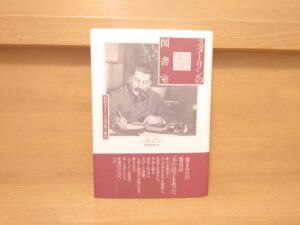
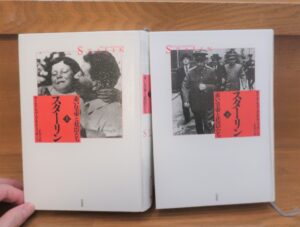
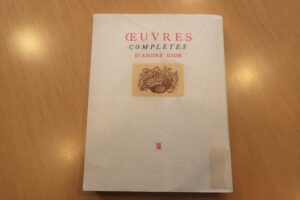

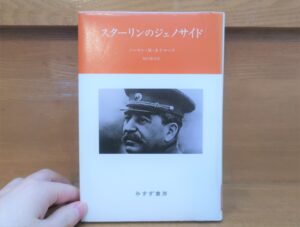
コメント